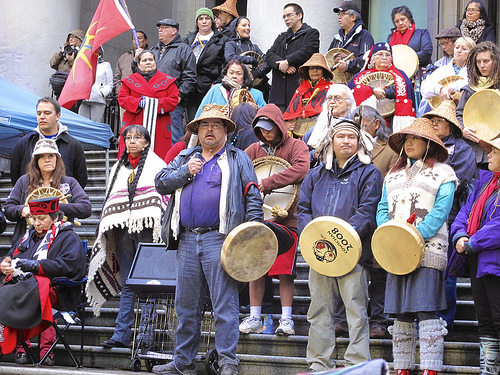Change the conversation, support rabble.ca today.
Those who expect one meeting to halt the protests don’t understand the Idle No More movement.
Canada’s Indigenous peoples have endured a generation of betrayed promises of change and missed opportunities. We are not about to waste another. The stakes are too great, for us and for Canadians. We are drawing a line in the sand.
History shows that prime ministers have always underestimated our will to survive as peoples. More than 40 years ago, Pierre Trudeau put forward his White Paper, the culmination of a hundred years of previous government policy.
The plan offered us an “equality” that would strip us of our identity, our status, our treaties and what remained of our homelands. We formed new political organizations, rallied across the country, and Mr. Trudeau had to withdraw his plan.
Ten years later, another crest of activism insured that Aboriginal and treaty rights were affirmed in the Constitution, again against Mr. Trudeau’s wishes.
Successive federal governments have refused to abandon Mr. Trudeau’s assimilation plan. Mr. Harper is attempting to implement this agenda through a suite of legislation and a strategy of political attrition, while developing Canada’s economy on the backs of our lands and resources.
In the 1980s, like now, first nations started blocking rails and roads across the country. The Innu in Labrador were arrested for camping on a NATO air base responsible for low flights over their land. Elijah Harper raised his feather to oppose the Meech Lake Accord. And when Mohawks near Oka attempted to block the razing of their cemetery for a golf course, and a standoff spiraled into a military siege of Kanehsatake and my home community of Kahnawake, indigenous peoples demonstrated across the country, raising awareness among Canadians that our grievances had never been resolved.
Brian Mulroney’s call for a Royal Commission on Aboriginal Peoples was part of a strategy to dampen the fires of unrest. Though born of a cynical calculus, the commission was the most exhaustive ever, and its blueprint for reconciliation between aboriginal peoples and Canada is as relevant todayas it was then.
It recognized the fact that we will not be assimilated, and that constant attempts to do so had only disastrous consequences. It recognized that we are nations with rights, enshrined in the Canadian constitution, to adequate land bases that would be the key to genuine self-government, economic development and healthy communities.
But when the Commission was released in 1996, the government responded with resounding silence. Canadians had by then turned their attention elsewhere, with protests no longer in the daily news. Of its hundreds of recommendations, barely a handful have been implemented.
Governments, whether Liberal or Conservative, have continued doing precisely what the Royal Commission warned against: tinkering with a colonial system, rather than fixing its rotten foundation. The issues identified by the Commission have never gone away.
Little wonder, then, that Idle No More is only the most visible and sustained expression of an uprising that has been building for years in Indian country. First Nations across the country have been battling destructive resource exploitation. In British Columbia, the Tsilhqot’in blocked a company from turning a sacred, fish-bearing lake into a miner’s tailings pond. The Tahltan protected their Sacred Headwaters from fracking. KI First Nation in Northern Ontario booted out platinum companies. And the Algonquins of Barriere Lake in Quebec have kept up their fight against clear-cut logging on their traditional lands.
The constitutional, legal and treaty rights that First Nations have brandished in these numerous but isolated victories are no fantasy, but a reality that Canada has no choice but to reckon with. And the power of the Idle No More movement is that it has started to show that these rights, if properly honoured, don’t just hold the promise of healthier, self-sufficient Indigenous communities. They offer non-native Canadians the promise of a country sustainably co-managed in the interests of generations to come. Is this road not preferable to Mr. Harper’s vision for continued strife?
Our challenge remains the same one articulated by the Royal Commissioners. “We have before us,” they wrote, “an agenda of decolonizing the relationship between aboriginal and non-aboriginal people in Canada — an agenda that the experience in other societies demonstrates is not an easy road to follow.” This call for a transformation of our relations has been more recently underlined by the United Nations’ Declaration on the Rights of Indigenous Peoples. The federal government signed the declaration after immense pressure, but has refused to implement it.
It took a national military crisis to get the Royal Commission. How much civil disobedience and economic disruption will Mr. Harper risk to avoid implementing it? We can reshape this country for the better, or expect continued conflict. Indigenous peoples have always been ready to fulfill the promise of mutual respect and just co-existence. The choice now is Canada’s.
Russell Diabo is a member of the Mohawk Nation at Kahnawake.
Photo: rabble.ca
This article was originally published in the Globe and Mail.



